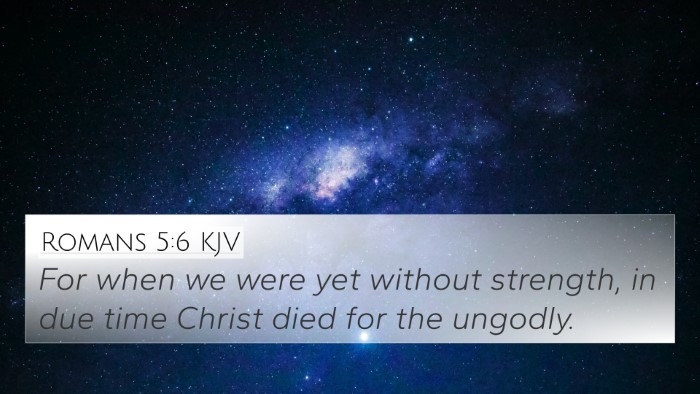Psalms 88:4 - Summary and Meaning
Bible Verse: Psalms 88:4
“I am counted among those who go down to the pit; I am like one without strength.”
Overview of Psalms 88:4
Psalms 88 is a unique psalm of lament, expressing profound sorrow and despair. In verse 4, the psalmist draws a vivid picture of his dire situation, equating himself with the dead and the weak. This serves to highlight his feelings of abandonment and hopelessness, which resonate deeply with many who experience distress.
Insights from Public Domain Commentaries
Matthew Henry's Commentary
Henry emphasizes the psalmist's portrayal of his condition, where he feels trapped in despair. The phrase "counted among those who go down to the pit" reflects a sense of being treated as dead, devoid of life and strength. It suggests that the psalmist is reaching out to God from the depths of sorrow, which can resonate with anyone facing life's challenging moments.
Albert Barnes' Notes on the Bible
Barnes elaborates on the significant imagery used in this verse. The "pit" symbolizes the grave or Sheol, a place of darkness and despair. The psalmist's use of the term "strength" indicates a feeling of helplessness, reinforcing the psychological state faced when one feels forsaken. Barnes underscores this as a call for divine intervention amidst agony.
Adam Clarke's Commentary
Clarke points to the emotional weight of this verse, emphasizing the psalmist's deep lament and sense of violation. The likening to those who are "without strength" implies not just physical weakness but a profound spiritual and emotional depletion. Clarke interprets this as a representation of an individual's desolation and distancing from God, invoking the need for hope and restoration.
Related Cross-References
This verse holds significance when considered along with several other scriptures that echo themes of despair, lament, and the search for God’s presence. Below are related Bible verse cross-references:
- Job 17:13-14: Job laments his state and contemplates his own mortality, similar in sorrow and sense of abandonment.
- Lamentations 3:54: Expresses deep anguish and the feeling of being overwhelmed, paralleling the emotional state of Psalms 88.
- Psalms 39:13: A plea for God's attention amidst suffering, showcasing a similar longing for divine intervention.
- Psalms 69:1: "Save me, O God!" reflects the outcry of a spirit crushed by despair, much like the sentiments in Psalms 88.
- Psalms 42:5: "Why are you cast down, O my soul?" connects the feeling of despair encountered in the psalmist's cry.
- Isaiah 38:17: In a time of distress, the prophet similarly addresses feelings of weakness and near-death experiences.
- Matthew 27:46: Jesus’ statement from the cross resonates with feelings of abandonment, linking His suffering to the anguish expressed in Psalms 88.
- 2 Corinthians 1:8-9: Paul writes of immense pressure and despair, reflecting the intensity of emotional suffering experienced in Psalms 88.
- Romans 8:35: Speaks to separation from God in trials, echoing the psalmist’s feelings in a broader theological context.
- Psalms 143:7: The psalmist's appeal for rescue in a time of trouble complements the desperate cry found in Psalms 88.
Thematic Connections
The key themes presented in Psalms 88:4—despair, abandonment, and a plea for help—are echoed throughout the Psalms and other biblical texts. Awareness of these thematic Bible verse connections enhances the deeper understanding and interpretation of one's spiritual struggles.
Conclusion
Psalms 88:4 invites reflection on the nature of human suffering and the earnest search for hope amid despair. It underscores the power of lament in scripture—allowing believers to express their sorrow while seeking connection with God. Cross-referencing this psalm with others provides a broader perspective on the human condition, resilience, and the divine's role in times of distress.
Tools for Bible Cross-Referencing
For those interested in exploring further, utilizing a Bible concordance or a Bible cross-reference guide can enhance understanding. Engaging in cross-reference Bible study methods can help delineate connections between verses and offer a comprehensive approach to scriptural analysis.














